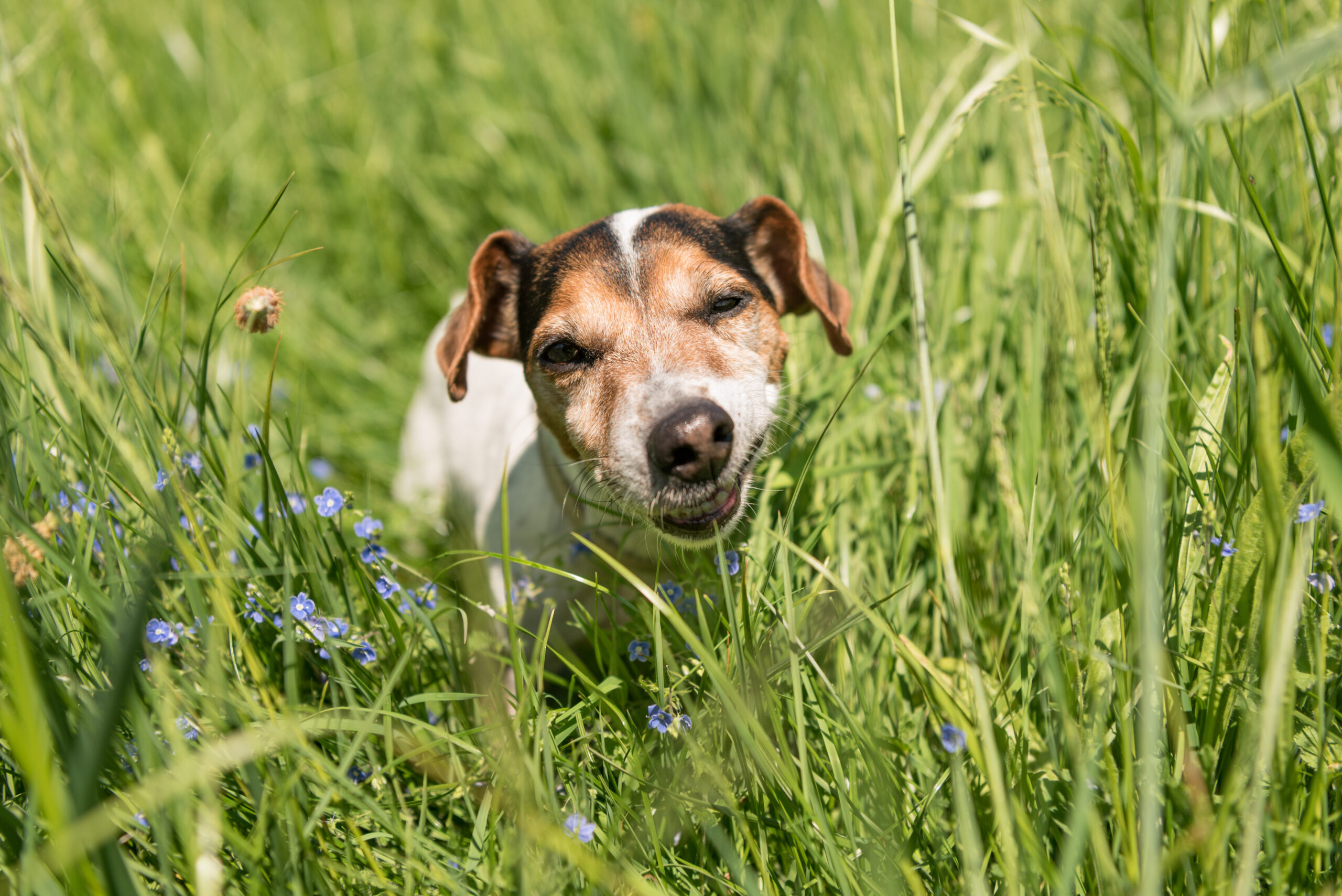Occasionally Harley decides to eat grass. My husband always asks the same question “Terri, why is Harley eating grass”. My answer is always the same, “I have no idea”. Sasha has been with us now for 4 months and we have not witnessed a blade of grass enter her mouth.
Why does Harley eat grass? I decided to do a little research.
Dogs may eat grass for various reasons, and it’s a common behavior among dogs.
Here are some of the reasons why dogs eat grass:
- Dietary deficiency: Sometimes, dogs may eat grass if they are not getting enough fiber or nutrients in their diet.
- Stomach upset: Eating grass may help dogs soothe an upset stomach or alleviate nausea. Grass may help induce vomiting or help to pass indigestible material through the digestive tract.
- Boredom or anxiety: Some dogs may eat grass out of boredom or anxiety, just as some humans may bite their nails or chew on their pencils.
- Instinctual behavior: Dogs are descendants of wolves, who would consume the entire prey animal including stomach contents, which can contain plant material. Eating grass may be an instinct for dogs.
- Taste and texture: Some dogs may simply enjoy the taste and texture of grass.
Let’s look at these closer:
1. How do you know if your dog is eating grass due to a dietary deficiency?
It can be difficult to know for sure if your dog is eating grass due to a dietary deficiency, as there are many possible reasons why dogs may eat grass. However, if your dog is consistently eating large amounts of grass or exhibiting other symptoms, it’s a good idea to consult with your veterinarian to rule out any underlying health issues.
Here are some signs that your dog may be experiencing a dietary deficiency:
- Weight loss or gain: If your dog is losing or gaining weight despite eating the recommended amount of food, it could be a sign that they’re not getting all the necessary nutrients in their diet.
- Dull coat or skin issues: A dull coat or skin issues, such as dryness or flakiness, can be a sign that your dog is not getting enough essential fatty acids or other nutrients.
- Lethargy or decreased activity: If your dog seems less active or enthusiastic than usual, it could be a sign that they’re not getting all the necessary nutrients in their diet.
- Digestive issues: Digestive issues such as diarrhea, vomiting, or constipation can be a sign that your dog is not getting all the necessary nutrients in their diet.
- Persistent grass-eating behavior: If your dog is consistently eating large amounts of grass and showing no signs of stopping, it could be a sign that they’re seeking out nutrients that are missing from their diet.
If your dog is eating grass out of dietary deficiency, it’s important to evaluate their diet and make sure they’re getting all the necessary nutrients.
First, consider switching to a high-quality, nutritionally balanced dog food that meets all of your dog’s nutritional needs. Look for dog food that contains high-quality protein sources, essential fatty acids, and a variety of vitamins and minerals.
If you’re already feeding your dog high-quality dog food but they’re still eating grass, consider adding some fresh fruits and vegetables to their diet. Many fruits and vegetables are high in vitamins, minerals, and fiber, which can help keep your dog healthy and satisfied.
2. How do you know if your dog is eating grass due to an upset stomach?
It can be difficult to determine the exact reason why your dog is eating grass, but an upset stomach is one common reason why dogs may eat grass.
Here are some signs that your dog may be eating grass due to an upset stomach:
- Vomiting: If your dog is eating grass and then vomiting, it is a good indication that they have an upset stomach.
- Diarrhea: If your dog is eating grass and experiencing loose stools or diarrhea, it could be a sign that they have an upset stomach.
- Lack of appetite: If your dog is eating grass and not showing interest in their usual food or treats, it could be a sign that they’re experiencing stomach discomfort.
- Lethargy: If your dog is eating grass and seems less energetic or enthusiastic than usual, it could be a sign that they’re not feeling well.
- Excessive drooling: If your dog is eating grass and drooling excessively, it could be a sign of an upset stomach.
If your dog is exhibiting any of these symptoms, it is a good idea to monitor their behavior and contact your veterinarian if the symptoms persist or worsen.
3. If your dog is eating grass out of boredom what should you do?
There are several things you can do to redirect their behavior and provide them with more stimulation:
- Increase exercise and playtime: A tired dog is less likely to engage in destructive or undesirable behaviors like eating grass out of boredom. Make sure your dog is getting plenty of exercise and playtime each day to help burn off excess energy.
- Provide interactive toys and puzzles: Interactive toys and puzzles can provide mental stimulation and keep your dog engaged and occupied. Consider toys that dispense treats or require your dog to solve a puzzle to access the reward.
- Teach new tricks or behaviors: Training your dog can provide mental stimulation and give your dog a sense of accomplishment. Teaching your dog new tricks or behaviors can also help strengthen the bond between you and your dog.
- Increase socialization opportunities: Dogs are social animals and often enjoy interacting with other dogs and humans. Consider taking your dog to a dog park or setting up playdates with other dogs to provide socialization opportunities.
- Limit access to grass: If your dog is eating grass out of boredom, you may need to limit the amount of time they are exposed to grass. Consider keeping your dog on a leash when outside or creating a designated play area that is free of grass.
Is eating grass bad for your dog?
Eating grass is generally not harmful to dogs, as long as the grass has not been treated with pesticides or other chemicals. In fact, some dogs may eat grass as a natural way to soothe an upset stomach or alleviate nausea.
However, if your dog eats grass frequently and in large amounts, it can pose a risk. Eating too much grass can cause digestive issues like vomiting, diarrhea, or constipation. Additionally, if the grass is contaminated with harmful substances or bacteria, it can make your dog sick.
If you notice your dog eating grass frequently and in large amounts, it’s a good idea to monitor their behavior and contact your veterinarian if you have concerns.
Do dogs eat grass more during warmer months?
There’s some evidence to suggest that dogs may eat more grass during the warmer months, although this can vary depending on the individual dog and their environment.
One reason why dogs may eat more grass during the warmer months is that they may be spending more time outdoors and have greater access to grass. Additionally, warmer weather can cause changes in a dog’s digestive system, leading them to seek out plants that may help soothe an upset stomach or alleviate nausea.
It is also possible that dogs may simply be more active and playful during the warmer months, leading them to engage in behaviors like eating grass.
Should I stop my dog from eating grass?
In general, there’s no need to actively stop your dog from eating grass unless they’re doing it excessively or it’s causing health problems. As I mentioned earlier, eating grass is a natural behavior for dogs and can even have some health benefits.
It is also important to ensure that the grass your dog is eating is not contaminated with harmful substances or bacteria. Avoid letting your dog eat grass that has been treated with pesticides or other chemicals, and supervise your dog when they’re outside to prevent them from eating grass in areas where other animals may have defecated.
In summary, while eating grass is generally not harmful to dogs, excessive grass consumption or contaminated grass can pose a risk. If you have concerns about your dog’s grass-eating behavior, it’s best to consult with your veterinarian.




